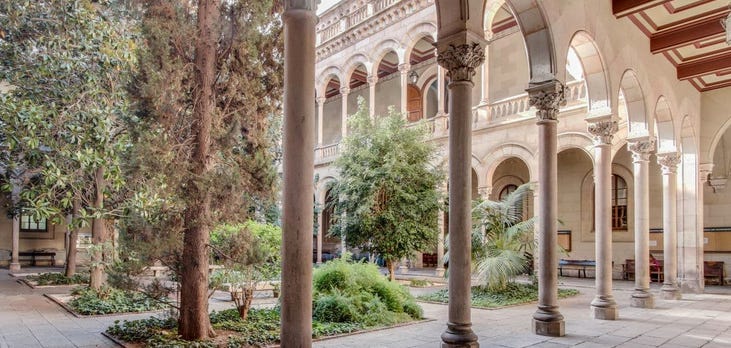quick note: if this video doesn’t load properly, let me know and I’ll upload a lower data version
In the school year of 1985/1986, I studied abroad at the University of Barcelona. The UB has departments all over the city, but the Facultad de Filología is right in the center of town, just a short walk from Plaza Catalunya and Las Ramblas. Here’s a classroom and the courtyard outside the classrooms.


They must have painted the walls, polished the wood and whitewashed the pillars, because I remember it being a lot more grimy back in the good ol’ 80s.
I have some fun anecdotes from Barcelona ‘85/’86 that I’ll share in future posts, but for now, I’ll just mention the two news events that stood out most starkly that year. It was the year of the Challenger disaster. I vaguely remember the newspaper headlines at the kiosks with the picture of the shuttle in the moments after the explosion. The second event was the American bombing of Libya in April of ‘86, ten days after the LaBelle Discoteque bombing in Berlin, in which three people died, including two US servicemen. I have a more vivid recollection of the second event, because our professor of modern Spanish history decided it would be appropriate to cancel the normal lesson and talk about the raid on Tripoli instead. A fiery debate ensued, largely between only two students: a petite, dark-complexioned, frizzy-haired Italian woman in the front row and an American black dude up in the very back, who had a resemblance to Flip Wilson. Giuliana was a firebrand, and sworn enemy of American imperialism. Flip was a patriotic American, but at a huge disadvantage because his Spanish was poor while Giuliana spoke impecabbly, and also had vast knowledge of America’s long list of foreign interventions. You could imagine her in green fatigues, a la People’s Liberation Army, with a red armband and portable megaphone, leading a march back at the University of Bologna, blocking the streets and smashing windows of the oppressor mercantile class. Flip kept tripping over sentence construction and words he couldn’t translate. Inbetween trying to explain his position in Spanish, he kept saying, “Uhh, you know…you know” and once Giulana got a laugh from the class by answering, in thick Italian accent. “Yes! I know!”
Giuliana definitely had the support of her European peers in the class. Many heads nodded each time she engaged Flip. (OK, I can’t help myself: I was going to say, “each time she fired a fusilade of ireffutable facts back at poor, flailing Flip,” cause I’m a sucker for cheap illiteration. Fine, Miss English 101 grad-student teacher, give me a D already.)
Flip was not without some support. An old, retired Dutch guy in the second row was in favor of the American retaliation for the Berlin bombing. I thought to myself, “Here’s an old dude with years of wisdom, trying to talk some sense into these idealistic but naive college kids.”
Why didn’t I join in and support my compatriot? First, my Spanish was about as poor as his. Second, what did I know about anything? Americans are the last ones to learn about their dark, brutal history of foreign interventions. Going up against Giuliana- it would be a bloodbath, with my blood. Sorry Flip- you’re on your own.
To his credit, the professor stayed mostly out of the fray. I think he got a kick out of his best student holding court and giving America a big, black eye. But also, I’m not sure he had a definite opinion on this one. He seemed a bit of a pragmatist/realist/might-makes-right type guy. He was a big fan of Golden-Age Spain, and never could resist telling us how the Spanish army was the “terror of Europe” and nothing happened without the involvement of the Spanish kings, etc.
When I saw a recent article on the Berlin discoteque bombing that led to the American raid on Tripoli, I decided I needed to interview the author. KLA TV agreed and you can watch it right here on Substack (click link at beginning of this article) or on KLA here.
postscript- I’ll include this one interesting section from the Wikipedia article on the bombing:
Blame and retribution
Almost immediately after the bombing, the American government, led by then-president Ronald Reagan, placed the blame on Libya.[5]: 77–80 However, the West German team investigating the bombing had not found any evidence of Libyan involvement, and other intelligence agencies throughout Europe also did not find evidence of Libyan involvement.[5]: 81 Nine days after the bombing, Reagan ordered airstrikes against the Libyan capital of Tripoli,[5]: 79–80 and city of Benghazi.[citation needed] At least 30 soldiers and 15 civilians were killed.[2][11][12]
Following the reunification of Germany, archives from the Stasi in East Germany were made available, which led to Libyan embassy worker Musbah Eter, who would later be indicted for aiding and abetting attempted murder.[2]
In 2001, a court in Germany found that the bombing had been "planned by the Libyan secret service and the Libyan Embassy", and convicted four people suspected to be involved with the attack, including two workers at the Libyan embassy in East Germany.[1] However, in their ruling, the court presiding over the trial complained that their decision was hindered by ''the limited willingness'' of the German and American governments to share intelligence,[1] and the trial was called "murky" by BBC News.[2] Notably, the trial failed to prove the involvement of then-Libyan leader Muammar Gaddafi.[2][1][6]




Share this post